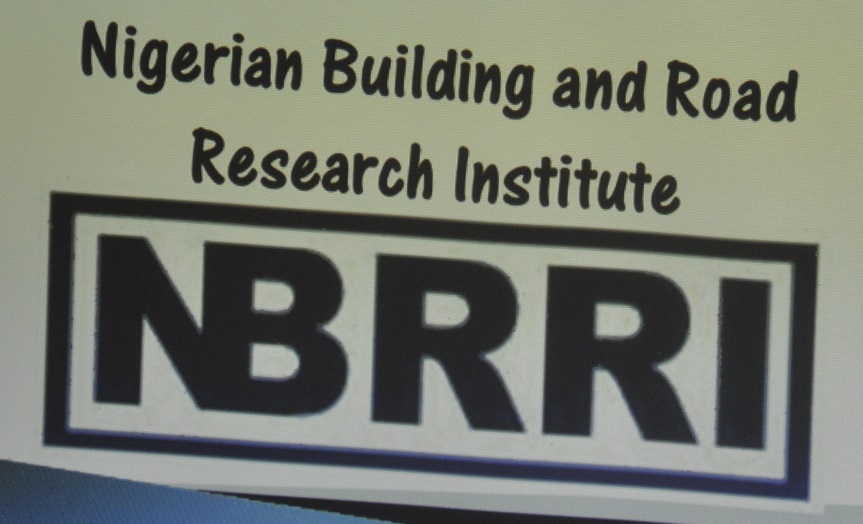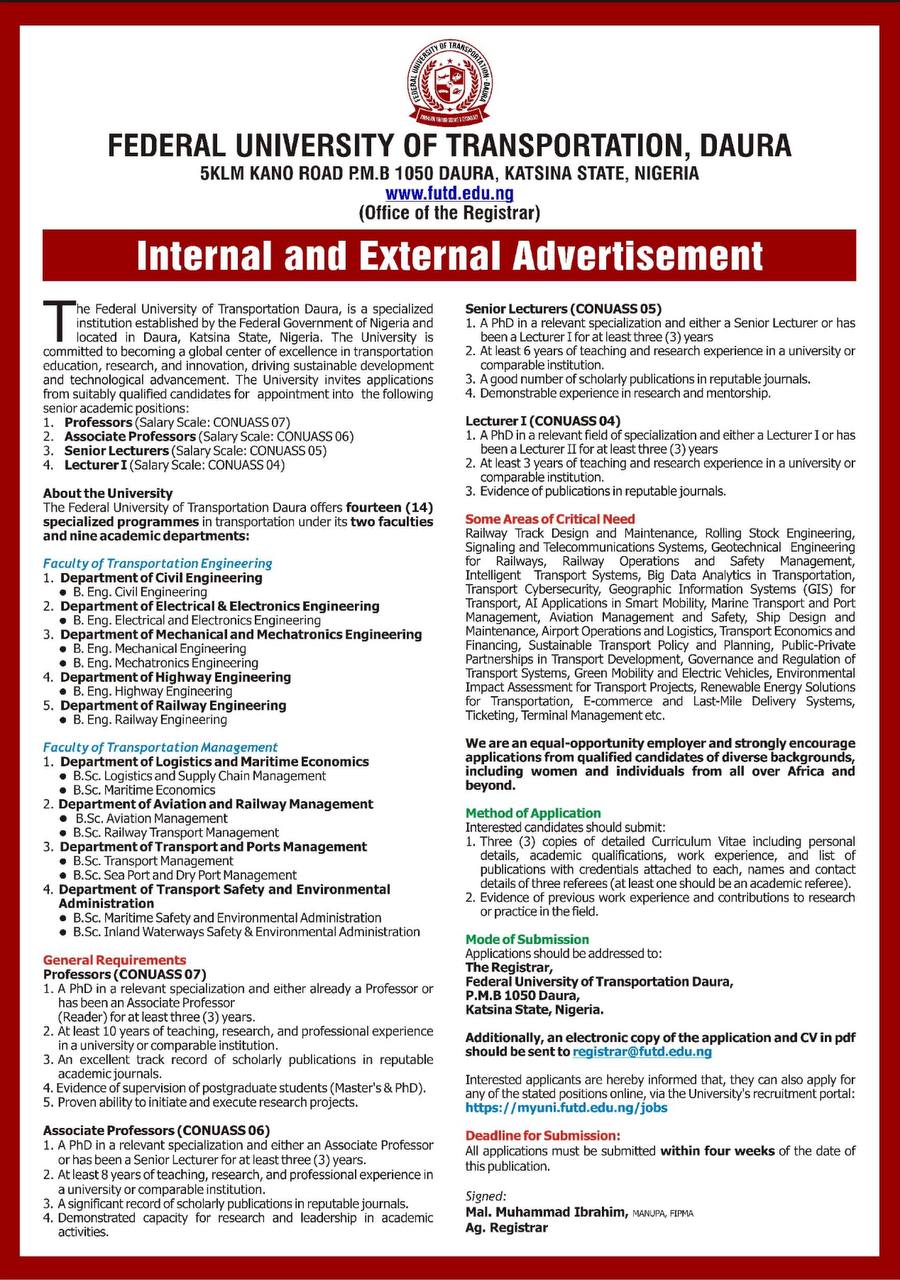Text of presentation by Prof. Samson Duna MNIEM,FNICE, FNSE, RE(COREN), Nigerian Building and Road Research Institute, at the 8th Nigeria Annual Transport Lecture organised by Transport Day Newspaper on Friday, May 21, 2021.
“IMPACT OF NIGERIAN BUILDING AND ROAD RESEARCH INSTITUTE (NBRRI) ON THE ECONOMY”
OUTLINE
- Introduction
- Vision of NBRRI
- Mission of NBRRI
- Mandate of NBRRI
- Impact of NBRRI
- Conclusion.
INTRODUCTION
-
- The contribution of the construction industry in Nigeria towards the economy and society can not be overemphasized.
- It was noted through various studies that the industry is behind its optimal performance of the Nigerian economy.
- However, in Nigeria, the industry contribution to the economy is not well recognized and the singular reason attributed to this underperformance of the industry is the lack of recognition for Research and Development (R&D) activities and innovation.
- The industry in Nigeria is faced with various challenges due to the changing market needs of the customers, health and safety issues, growing concern on sustainable work practices, government regulations etc.
- In order to face these challenges, while raising the profile of the construction industry, it is essential to create new ways to deliver the construction output in an economically, socially, and environmentally acceptable manner.
- In this regard, R&D is a key factor behind the development of effective and efficient construction processes, new materials, advanced technologies, new procurement routes, and managerial structures.
- In addition, successful implementations of R&D activities create opportunity for construction organizations to be competitive in the global market. Hence, R&D plays a significant role by focusing and directing the construction industry towards achieving its excellence
- According to the National Bureau of Statistics, Nigeria, the construction industry contributes greatly to the GDP of the country.
- GDP From Construction in Nigeria increased to 679,254.80 NGN Million in the fourth quarter of 2020 from 572,977.23 NGN Million in the third quarter of 2020.
- It is on this basis that this paper focused on the impact of the Nigerian Building and Road Research Institute (NBRRI) on the Nigerian economy.
VISION OF NBRRI
- NBRRI established via NSTDA decree 1977 & commenced operations 1st April 1978 with an aim to ‘build capacity, conduct integrated applied Research and Development & set the pace in indigenous construction
- technology development.
- Its vision was to improve the quality of life of Nigeria in the area of affordable housing and increased economic empowerment through integrated R&D, Capacity Building, technological innovations and Knowledge-based practices in the fields of Building.
MISSION OF NBRRI
- To evolve & use a comprehensive integrated approach in appropriate technology development & transfer, sustainable capacity building & investment promotion to foster the application of environment-friendly & energy-efficient innovative construction materials, manufacturing technologies for cost-effective building & road construction practices that will enhance job creation, wealth generation & poverty reduction as well as nurture the emergence of vibrant, knowledge-based & highly competitive indigenous construction practice capable of meeting global standards.
NBRRI function is easily summarised as:
‘’CAPACITY BUILDING AND THE CONDUCT OF INTEGRATED APPLIED R&D IN BUILDING, ROAD AND CONSTRUCTION SECTORS OF THE ECONOMY ‘’
MANDATE OF NBRRI
- NBRRI was established to conduct integrated applied research and development into the varied aspects of the building and construction sectors of the economy.
- In the Act setting up NBRRI, she is required to conduct research on:
(i) Local building and construction materials to determine the most effective and economic methods of their utilization;
(ii) Architectural design of buildings to suit Nigerian climatic conditions with respect to lighting, ventilation, thermal comfort and humidity;
(iii) The design and performance of functional units in buildings including electrical installations, plumbing, painting, drainage, ventilation and air-conditioning system;
(iv) Local construction, foundation and earth-works for buildings and bridges, especially on problem soils;
(v) Local construction and building operations and methods, to increase their effectiveness;
(vi) The design and construction of roads best suited to the Nigerian environment;
(vii) The economic and social aspects of the building and construction industry;
(viii) Road safety including the occurrence of accidents and methods of reducing the number of accidents;
(ix) The economic and social aspects of road and transportation schemes, accidents and safety measures;
(x) Structural designs of buildings and bridges and the development of design criteria, specifications and codes of practice;
(xi) All classes of engineering materials – metals, ceramics, polymers, etc.,
In addition, to the above, the Institute also provides:
(a) Consulting services relating to Building, Road and Engineering Materials to individuals, public and private organizations;
(b) Specialist support services to medium and small-scale enterprises in the areas of training, testing and evaluation of products, materials characterization, materials selection (specification), among others
THE AREAS NBRRI HAS IMPACTED ON NIGERIA ECONOMY
The Impact of the Nigerian Building and Road Research Institute (NBRRI) on the economy can be felt in the following areas of its Research and Development.
A. Capacity Building
B. Import Substitution
C. Study Of Engineering Characteristics Of Subgrade Soils For Economic Pavement Design
D. Infrastructural Development
E. Wealth Creation
F. Employment Creation
A. CAPACITY BUILDING
- WORKSHOPS AND CONFERENCES
The Institute organizes workshops and Conferences where several issues on Building, Road and Precise Engineering are discussed. These conferences allow researchers, students and practitioners to bring to the fore issues bore of Research, Development and Innovation and proffer solutions to an emerging issue.
The continuous conferences carried out have reduced the need to build the capacity of experts, students to spend money going abroad for the same reason of building capacity.
- CURRICULUM DEVELOPMENT FOR ARTISANS IN THE CONSTRUCTION INDUSTRY
NBRRI developed a robust, practical and relevant competency-based curriculum for the training of artisans in 10 selected trades in the construction industry namely; Masonry, Carpentry, Electrical installation, Plumbing and fittings, Floor finishing, Iron bending, e,t.c.
In pursuit of excellence, NBRRI established two centres (Lagos and Plateau State)
These centres currently have N-Power programmes ongoing and the centres have successfully train artisan in different vocational pursuit as listed above.
- CURBING THE INCIDENCE OF BUILDING COLLAPSE
In 2011 alone, several buildings collapsed in different parts of the country including Abuja, Lagos, Enugu, Sokoto, Port Harcourt, Awka, etc. though, within its mandate, the Nigerian Building and Road Research Institute (NBRRI) was able to investigate only a few cases due to limited resources.
The Institute has published several reports of the investigations carried out at various collapse sites like the Technical Report No. 23, 26,29, 46,47,51 and others.
- ESTABLISHMENT OF MATERIAL TESTING LABORATORY
In its bid to enrich the quality of research-related activities, the Institute equipped the new laboratory in Abuja headquarters.
The Laboratory Complex in Abuja is new, has successfully conducted
- Cement,
- Soil,
- Concrete
- Asphalt/Bitumen tests.
- DEVELOPING A CONCRETE MIX DESIGN MANUAL FOR NIGERIA
The research work was aimed at addressing the controversy in the industry on the application of various strength classes of cement for construction works.
The Institute developed a manual that provides a step by step procedure for carrying out mix designs for the various grades of concrete by deducing the appropriate quantities of materials required for each mix.
- EQUIPPING THE FABRICATION WORKSHOP
This initiative is to provide fabrication equipment required for Research and Development in the Engineering Materials Research Department.
These machines are capable of generating job opportunity for the unemployed when completely installed.
B. IMPORT SUBSTITUTION
1. POZZOLANA CEMENT
In line with the current thrust of the Institute to boost local content and produce a cheap, qualitative and yet highly competitive alternative to the conventional Portland cement, a product known as NBRRI Blended Pozzolana Cement will soon be in the market. NBRRI Pozzolana cement can be used with Portland cement at a ratio depending on raw material but varying from 20:80 to 50:50. This will reduce the cost of housing provision.
The Institute has impacted positively with the setting up of the Pozzolana Cement plant in, Ota Ogun State and Bokkos, Plateau State.
The Pozzolana plant brings these gains to the community where they are established
- Provision of Youth Development Centre for the acquisition of entrepreneurial skills for sustainable self-employment, employment generation and promotion of SMEs.
- Leadership Training and reduction of youth restiveness and vices. To create employment and reduce the poverty level. Economic empowerment of local communities and to Promote Internal Communal Integration etc.
2. CUBE MOULD: In the bid for NBRRI to save foreign exchange, the Institute has come up with 3 types of Moulds:
- NBRRI CUBE Mould Concrete,
- NBRRI Cube Mould- Cement Mortar and
- NBRRI- Mould- Reinforced Concrete Beam.
The country spendS over 300 million annually to import these Cube moulds, NBRRI designed and fabricated these Cube Moulds for use in the construction industry sector and higher institutions to train graduates and undergraduates.
C. STUDY OF ENGINEERING CHARACTERISTICS OF SUBGRADE SOILS FOR ECONOMIC PAVEMENT DESIGN
- DIGITIZED SUBGRADE SOILS MAPPING
The existing Nigerian road network map produced in the past was observed to have some errors arising from poor alignment with the World base-map from google earth. To this end, the institute embarked upon reviewing and updating the road network map through the re-digitization process.
- PRODUCTION OF NIGERIAN SUBGRADE SOIL ATLAS MAP
Nigerian Subgrade Soil Atlas is a compendium of soils maps of different states of the Federation. The document is meant to serve as a digital map of the country’s Subgrade soil attribute thus, create awareness and educate both government and the public particularly engineers and scientist of the importance of soils in Nigeria and also meet the global trend.
D. INFRASTRUCTURAL DEVELOPMENT
NBRRI had embarked on numerous infrastructures developmental projects among which have impacted the national economy positively, among which are:
- Design and Construction of Rural Access Roads using Community-Based technology
The major aim of this technology is to introduce and popularize the use of Community-Based Technology i.e. Labour Based/ Light Equipment Technology for the construction of quality, cost-effective Access Roads.
2. NBRRI Skills Acquisition and Extension Centres Using NBRRI Technologies
This has contributed to National Infrastructure in Benue, Ondo, Ogun, Akwa-Ibom and Plateau States. This centre serves as a place for entrepreneurial skills development for sustainable self-employment, employment generation and promotion of SMEs.
The process of using the technology, transfer technology and building the capacities of Youths, Artisans and Technologists etc takes place in benefiting Communities on the use of alternative but cost-effective and durable building materials and technologies in housing delivery.
3. PRODUCTION OF LAMINATED BAMBOO PANELS FROM NIGERIAN BAMBOO
This study produced a Composite Material in the form of a Laminated Bamboo Panel (LBP) from round bamboo culms. The panels produced by lamination of bamboo strips would reduce inherent variability in geometry and mechanical properties associated with the use of bamboo in its natural state. This research has been able to illustrate that bamboo can be modernized and industrialized to produce panels that can be used for flooring, roofing, partitions, doors and window frames, ceiling, walls, fences, trusses and rafters in building application.
4. EROSION CONTROL PROJECTS IN NIGERIA
Some Zones in Nigeria are prone to erosion and NBRRI seeks to make our society aware of the various aspects of landslide/erosion hazards in the country in relation to its effects on our road networks and to prepare the society to take suitable action to reduce both risks and costs associated with these hazards. NBRRI also identify areas prone to landslides along with road networks and carry out remedial measures.
5. NBRRI MOVEABLE HOUSE
The NBRRI Moveable house is one of the many innovations that gave NBRRI the overall second position at the 2017 Science and Technology Expo. The dismountable building uses movable UBs as its foundation and metal sheets to form the columns. It can be relocated from one position to another by merely dismantling the entire structure and taking it to the new site for construction of a new movable house in the new location.
E. WEALTH CREATION
NBRRI has, through its operating activities, impacted substantially in wealth creation as evident in the following aspects:
- Setting up of Pozzolana cement plant:
The Pozzolana cement plant when fully in stream will reduce the cost of building construction by about 70% paves way for the low and medium-income earners to afford decent accommodation and thereby create wealth for these categories of Nigerians. The more affordable houses become, the more people will build. The more people build, the more Artisans and Technologists that will be employed and by extension, more wealth creation.
2. The design and fabrication of NBRRI CUBE MOULDS
A highly reduced rate has created opportunities for Artisans, Masons, Fabricators and other Technologists to obtain gainful employment and consequently ensure wealth creation.
F. EMPLOYMENT CREATION
NBRRI Technologies developed in roads, building and engineering materials sectors were designed with the sole purpose of empowering the youth in the use of NBRRI technologies.
The Institute programmes of Skill Development Centre, Pozzolana Cement (NBRRI Cement) and Rural Access road using labour-based technology has increased the level of national employment by 0.1 % in the last year with the employment of local people in the clearing works and the digging of trenches, empowered the local contractors and supplier of materials and the local food sellers who sell on these construction sites.
CONCLUSION
The industry in Nigeria faces lots of challenges and this affects its contributions to the economy.
This presentation has shown that NBRRI has taken the role of reducing the cost of construction through Research and Development and Innovation and it has played a key role in the provision of alternative construction equipment and also reduce import substitution.
All activities taken by NBRRI have greatly improved the life of Nigerians and generate employment for Nigerians and revenue to the government.













